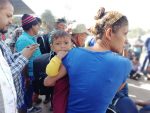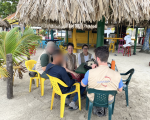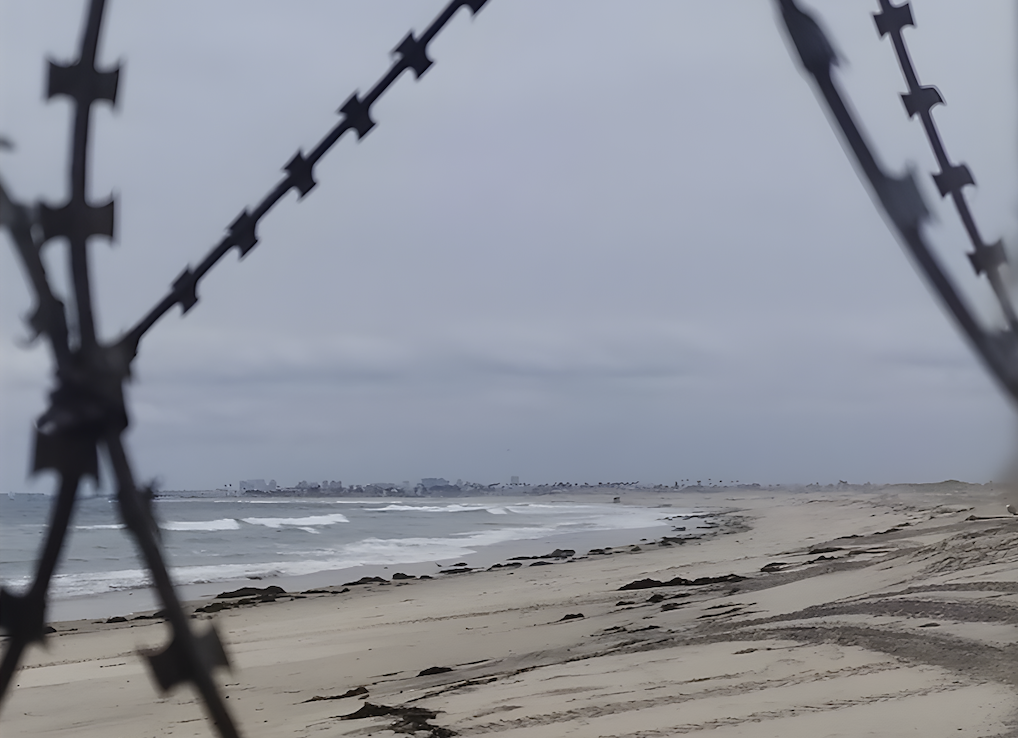Latest Updates
Mediterranean Corridors – Tracing the Footsteps of Organized Crime Groups (OCGs) in Migrant Smuggling Article for the April, web edition of Praxis The Fletcher Journal of Human Security, By Aristedis Bouras In his article for Praxis, Aristedis Bouras analyzes migrant movements on the Mediterranean Sea. “The Mediterranean, known for its historical significance, now witnesses the plight of thousands seeking safer shores, only to encounter dangerous journeys.” After describing the dangers awaiting migrants during their journey across, Bouras writes: “As the Mediterranean continues to bear witness to one of the most significant movements of people in modern history, the stories of those who traverse its waters are a testament to both human desperation and resilience. The need for informed, compassionate, and effective policies has never been more critical.” Read more of Aristedis Bouras article here:
Governance, Violence, and Migration: Lessons Learned from El Salvador and Honduras By Leir-affiliated Faculty Anjuli Fahlberg, Katherine Garcia, Laura Garcia and Justin Pérez For over a year, a team of four researchers from Tufts University, El Salvador, and Honduras has been investigating the impact of differing governance approaches on violence and human rights in El Salvador and Honduras. They share with us some of their findings on how governance and violence are impacting migration into and out of Central America. Anjuli Fahlberg, Katherine Garcia, Laura Garcia and Justin Pérez share with us some of the lessons they learned during their research, including: How Central American countries are dealing with many of the same struggles as the United States as new migrants arrive in search of safety and resources.How state repression is often just as potent a threat as the criminal violence of local gangs.The incredible risks that migrants take. To be observant of how journalists are reporting about migration. Read more of Anjuli Fahlberg, Katherine Garcia, Laura Garcia and Justin Pérez’s research here:
Leaving Lebanon: A Panacea After the Financial Collapse? In this issue of Leir Migration Monitor, Leir-affiliated faculty Tamirace Fakhoury shares her story for The Lebanese Center for Policy Studies (LCPS) on the dilemma of staying or migrating from Lebanon. As she puts it, “What happens when states no longer offer hope for their people? Is flight the solution? Or do crises unlock opportunities for new beginnings?” Read Professor Fakhoury’s story for LCPS here:
Hopes, Fears, and Illusions: Navigating Trauma-Informed Research with Migrants on the Move In our latest Notes from the Field entry, Co-Principal Investigator Dr. Kimberly Howe and Project Manager Shenandoah Cornish share insights on HFI’s trauma-informed methodology, which encourages researchers to be reflexive, to be aware of power dynamics, and to actively mitigate the risk of re-traumatization of informants. Howe and Cornish reflect, “By contemplating the implications of our inquiries, we strove to foster an environment that respected the autonomy and agency of those who choose to share their stories.”
Newsletters

Mediterranean Corridors – Tracing the Footsteps of Organized Crime Groups (OCGs) in Migrant Smuggling Article for the April, web edition of Praxis The Fletcher Journal of Human Security, By Aristedis Bouras In his article for Praxis, Aristedis Bouras analyzes migrant movements on the Mediterranean Sea. “The Mediterranean, known for its historical significance, now witnesses the plight of thousands seeking safer shores, only to encounter dangerous journeys.” After describing the dangers awaiting migrants during their journey across, Bouras writes: “As the Mediterranean continues to bear witness to one of the most significant movements of people in modern history, the stories of those who traverse its waters are a testament to both human desperation and resilience. The need for informed, compassionate, and effective policies has never been more critical.” Read more of Aristedis Bouras article here:

Governance, Violence, and Migration: Lessons Learned from El Salvador and Honduras By Leir-affiliated Faculty Anjuli Fahlberg, Katherine Garcia, Laura Garcia and Justin Pérez For over a year, a team of four researchers from Tufts University, El Salvador, and Honduras has been investigating the impact of differing governance approaches on violence and human rights in El Salvador and Honduras. They share with us some of their findings on how governance and violence are impacting migration into and out of Central America. Anjuli Fahlberg, Katherine Garcia, Laura Garcia and Justin Pérez share with us some of the lessons they learned during their research, including: How Central American countries are dealing with many of the same struggles as the United States as new migrants arrive in search of safety and resources.How state repression is often just as potent a threat as the criminal violence of local gangs.The incredible risks that migrants take. To be observant of how journalists are reporting about migration. Read more of Anjuli Fahlberg, Katherine Garcia, Laura Garcia and Justin Pérez’s research here:

Leaving Lebanon: A Panacea After the Financial Collapse? In this issue of Leir Migration Monitor, Leir-affiliated faculty Tamirace Fakhoury shares her story for The Lebanese Center for Policy Studies (LCPS) on the dilemma of staying or migrating from Lebanon. As she puts it, “What happens when states no longer offer hope for their people? Is flight the solution? Or do crises unlock opportunities for new beginnings?” Read Professor Fakhoury’s story for LCPS here:

Hopes, Fears, and Illusions: Navigating Trauma-Informed Research with Migrants on the Move In our latest Notes from the Field entry, Co-Principal Investigator Dr. Kimberly Howe and Project Manager Shenandoah Cornish share insights on HFI’s trauma-informed methodology, which encourages researchers to be reflexive, to be aware of power dynamics, and to actively mitigate the risk of re-traumatization of informants. Howe and Cornish reflect, “By contemplating the implications of our inquiries, we strove to foster an environment that respected the autonomy and agency of those who choose to share their stories.”

To our alumni and friends, As I reflect on global events since June, I am struck by how desperately the world needs a human security lens. States and non-state actors continue to prioritize power and profit while individuals and communities get caught in the crossfire. The most obvious example is the Hamas-Israel War, which has claimed the lives of at least 18,000 civilians and displaced around 1.8 million people. But it is not the only one. In just the last six months, thousands of people died in climate-induced floods in North Africa; over 100,000 Armenians were displaced by an Azerbaijani military offensive in Nagorno-Karabakh; deadly conflicts broke out in Sudan, the DRC, and Myanmar; and the war in Ukraine continued unabated. All of these crises uprooted people from their homes, contributing to the estimated 114 million forcibly displaced persons worldwide. Since January, more than 500,000 migrants from dozens of countries have crossed the Darien Gap, a treacherous unpaved jungle between Colombia and Panama, in search of safety and sustenance.
Programs

Digital Portfolios of the Poor (DPP) is a multi-year, multi-country project aimed at creating better digital financial products for the poor by understanding how emerging technologies are viewed, used, understood, and perceived in low-income settings, particularly among women.

Disrupted Mobilities is a multimedia project inspired by the Leir-sponsored 2019 documentary, Waylaid in Tijuana, that explores the intersecting effects of blocked asylum, deportation, and restricted cross-border movement in communities along the US-Mexico border.

Hopes, Fears, and Illusions (HFI) examines how U.S.-bound migrants assess risk and process information along their journeys to the U.S.-Mexico border through in-depth field work with migrants on the move in Colombia, Costa Rica, and Mexico.

Journeys Project (JP) examines migrant stories to better understand the costs and strategies involved in their journeys as well as the economic approaches they use when putting down roots in new surroundings.

The Leadership in Migration Initiative (LMI) has as a primary goal to establish a comprehensive understanding of migration leadership through global best practices and real-world experiences, fostering constructive dialogues on effective leadership in this domain.

The Refugees in Towns (RIT) promotes understanding of the migrant/refugee integration experience by drawing on the knowledge and perspectives of refugees themselves as well as local hosts.
Leir Briefing Room
Migration and human security, simplified. Three-minute briefs written by the Fletcher School's expert faculty and home of the Leir Migration Monitor newsletter. It centralizes the Leir Institute's research and analysis for practitioners and policymakers, providing clear, concise information on migration and human security. For clear, concise foundational content, start here.





